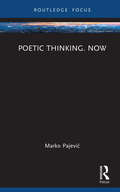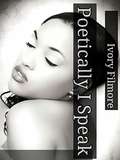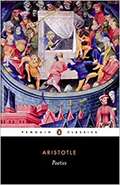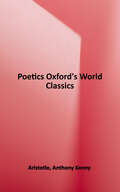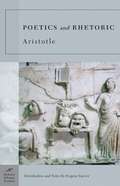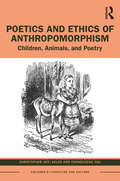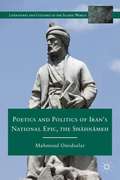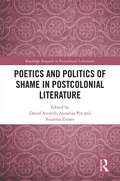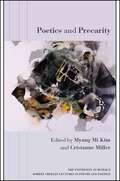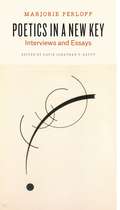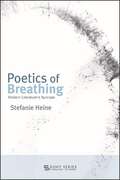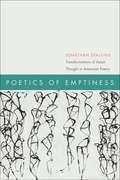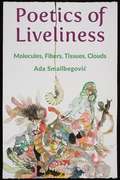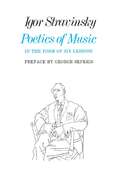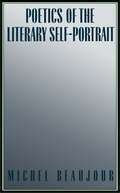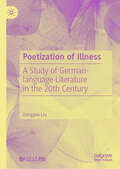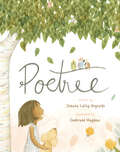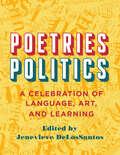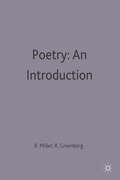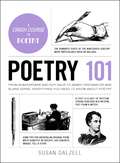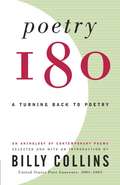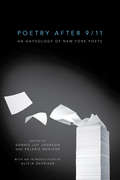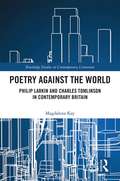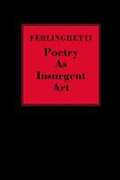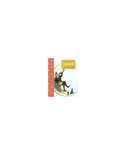- Table View
- List View
Poetic Thinking. Now (Routledge Focus on Literature)
by Marko PajevićThis book presents my concept of poetic thinking in the context of debates around the anthropological question, that is ‘what is being human?’, building on ‘thinking language’ and dialogical thinking, developing a poetological anthropology. It evokes political and social issues to demonstrate why poetics is of general relevance for our times. The chapters relate these questions to insights of quantum physics and neurosciences and discuss aspects of contemporary technology, media and medicine, employing notions such as atmospheres, immanent transcendence, silence and presence from contemporary thinkers. Poetic thinking considers the world in its togetherness, offering an alternative to the opposition of subject and object. It demonstrates the transformative power in the interaction of the form of language and the form of life. Poetic thinking takes place when a subject constitutes itself in creative and dialogical language, transforming its ways of feeling and thinking, in short, its way of perceiving the world.
Poetically I Speak
by Ivory FilmoreThis book is a collection of quotes, and poems that one can relate to about love, heartache, and different emotions. Stay connected Instagram: @poeticisjustice If you enjoyed this book please feel free to leave a review.
Poetics
by Aristotle Malcolm HeathIn the Poetics, his near-contemporary account of classical Greek tragedy, Aristotle examine the dramatic elements of plot, character, language and spectacle that combine to produce pity and fear in the audience, and asks why we derive pleasure from this apparently painful process. Taking examples from the plays of Aeschylus, Sophocles and Euripides, the Poetics introduced into literary criticism such central concepts as mimesis ('imitation'), hamartia ('error') and katharsis, which have informed serious thinking about drama ever since. Aristotle explains how the most effective tragedies rely on complication and resolution, recognition and reversals, while centring on chaaracerts of heroic stature, idealised yet true to life. One of the most perceptive and influential works of criticism in Western literary history, the Poetics has informed serious thinking about drama ever since. <p><p> Malcolm Heath's lucid translation makes the Poetics fully accessible to the modern reader. In this edition it is accompanied by an extended introduction, which discusses the key concepts in detail, and includes suggestions for further reading.
Poetics (Oxford World's Classics Ser.)
by AristotleAristotle's Poetics is the most influential book on poetry ever written. A founding text of European aesthetics and literary criticism, from it stems much of our modern understanding of the creation and impact of imaginative writing, including poetry, drama, and fiction. <p><p>For Aristotle, the art of representation conveys universal truths that we can appreciate more easily than the lessons of history or philosophy. In his short treatise Aristotle discusses the origins of poetry and its early development, the nature of tragedy and plot, and offers practical advice to playwrights. <p><p>This new translation by Anthony Kenny is accompanied by associated material from Plato and a range of responses from more modern literary practitioners: Sir Philip Sidney, P. B. Shelley, and Dorothy L. Sayers. The book includes a wide-ranging introduction and notes, making this the most accessible and attractive modern edition.
Poetics And Rhetoric (Barnes And Noble Classics)
by Aristotle S. H. Butcher George Stade Eugene Garver W. Rhys RobertsPoetics and Rhetoric, by Aristotle, is part of the Barnes & Noble Classics series, which offers quality editions at affordable prices to the student and the general reader, including new scholarship, thoughtful design, and pages of carefully crafted extras. <P><P> Here are some of the remarkable features of Barnes & Noble Classics: New introductions commissioned from today's top writers and scholars Biographies of the authors Chronologies of contemporary historical, biographical, and cultural events Footnotes and endnotes Selective discussions of imitations, parodies, poems, books, plays, paintings, operas, statuary, and films inspired by the work Comments by other famous authors Study questions to challenge the reader's viewpoints and expectations Bibliographies for further reading Indices & Glossaries, when appropriate All editions are beautifully designed and are printed to superior specifications; some include illustrations of historical interest. Barnes & Noble Classics pulls together a constellation of influences--biographical, historical, and literary--to enrich each reader's understanding of these enduring works. <P><P> It is no exaggeration to say that all Western literary criticism flows from Aristotle. In the Poetics he focuses mainly on drama, especially tragedy, and introduces ideas that are still being debated more than two thousand years later. Among them is the often misunderstood theory of the unities of action, place, and time, as well as such concepts as: art as a form of imitation, and drama as an imitation of human actions; plot as a drama’s central element, and "reversal” and "recognition” as important elements within a plot; and the purging of pity and fear from the audience as the function of tragedy. Rather than offer these ideas merely as abstract theories, Aristotle applies them in cogent analyses of the classic Greek dramas--the tragedies of Aeschylus, Sophocles, and Euripides. <P><P> In the Rhetoric, Aristotle turns to the principles of persuasive writing, including argumentation and the logical development of proof, appeals to emotion, and matters of delivery and style. Perhaps most essentially, Aristotle teaches us how to engage in the central civic activities of accusing and defending, recommending policies, and proving and refuting ideas. <P><P> These two foundational works are key documents for understanding the culture and politics of Western civilization, and how they continue to evolve today. <P><P> Eugene Garver is Regents Professor of Philosophy at Saint John’s University, Collegeville, Minnesota. He is the author of Machiavelli and the History of Prudence, Aristotle’s Rhetoric: An Art of Character, For the Sake of Argument: Practical Reasoning, Character, and the Ethics of Belief, and the forthcoming Living with Thought: A Confrontation with Aristotle’s Ethics.
Poetics and Ethics of Anthropomorphism: Children, Animals, and Poetry (Children's Literature and Culture)
by Christopher Kelen Jo You ChengchengPoetics and Ethics of Anthropomorphism: Children, Animals, and Poetry investigates a kind of poetry written mainly by adults for children. Many genres, including the picture book, are considered in asking for what purposes ‘animal poetry’ is composed and what function it serves. Critically contextualising anthropomorphism in traditional and contemporary poetic and theoretical discourses, these pages explore the representation of animals through anthropomorphism, anthropocentrism, and through affective responses to other-than-human others. Zoomorphism – the routine flipside of anthropomorphism – is crucially involved in the critical unmasking of the taken-for-granted textual strategies dealt with here. With a focus on the ethics entailed in poetic relations between children and animals, and between humans and nonhumans, this book asks important questions about the Anthropocene future and the role in it of literature intended for children. Poetics and Ethics of Anthropomorphism: Children, Animals, and Poetry is a vital resource for students and for scholars in children’s literature.
Poetics and Politics of Iran’s National Epic, the Shāhnāmeh
by Mahmoud OmidsalarThis book considers some of the Western interpretations of The Shahnameh - Iran's national epic, and argues that these interpretations are not only methodologically flawed, but are also more revealing of Western concerns and anxieties about Iran than they are about the Shahnameh.
Poetics and Politics of Shame in Postcolonial Literature (Routledge Research in Postcolonial Literatures)
by David Attwell Annalisa Pes Susanna ZinatoPoetics and Politics of Shame in Postcolonial Literature provides a new and wide-ranging appraisal of shame in colonial and postcolonial literature in English. Bringing together young and established voices in postcolonial studies, these essays tackle shame and racism, shame and agency, shame and ethical recognition, the problem of shamelessness, the shame of willed forgetfulness. Linked by a common thread of reflections on shame and literary writing, the essays consider specifically whether the aesthetic and ethical capacities of literature enable a measure of stability or recuperation in the presence of shame’s destructive potential. The obscenity of the in-human, both in the colonial setting and in aftermaths that show little sign of abating, entails the acute significance of shame as a subject for continuing and urgent critical attention.
Poetics and Precarity (The University at Buffalo Robert Creeley Lectures in Poetry and Poetics)
by Myung Mi Kim; Cristanne MillerAt a time when wars, acts of terrorism, and ecological degradation have intensified and isolationism, misogyny, and ethnic divisiveness have been given distinctively more powerful voice in public discourse, language itself often seems to have failed. The poets and critics in this book argue that language has the potential to address this increasing level of discord and precarity, and they negotiate ways to understand poetics, or the role of the poetic, in relation to language, the body politic, the human body, breath, the bodies of the natural environment, and the body of form.Poetry makes urgent issues audible and poetics helps to theorize those issues into critical consciousness. Poetry also functions as a cry to protest late capitalist imperialism, misogyny, racism, climate change, and all the debilitating conditions of everyday life. Hubs of concern merge and diverge; precarity takes differently gendered, historied, embodied, geopolitical manifestations. The contributors articulate a poetics that renders what has not yet been crystallized as discourse into fields of force. They also acknowledge the beauties of sound, poetry, and music, and celebrate the power of community, marking the surge of energy that can occur at a particular place at a particular moment. Ultimately, Poetics and Precarity fosters further conversations that will imagine the concerns of poetics as a continuously emerging field.
Poetics in a New Key: Interviews and Essays
by Marjorie PerloffMarjorie Perloff writes in her preface to Poetics in a New Key that when she learned David Jonathan Y. Bayot wanted to publish a collection of her interviews and essays, she was “at once honored and mystified.” But to Perloff’s surprise and her readers’ delight, the resulting assembly not only presents an accessible and provocative introduction to Perloff’s critical thought, but also highlights the wide range of her interests, and the energetic reassessments and new takes that have marked her academic career. The fourteen interviews in Poetics in a New Key—conducted by scholars, poets, and critics from the United States, Denmark, Norway, France, and Poland, including Charles Bernstein, Hélène Aji, and Peter Nicholls—cover a broad spectrum of topics in the study of poetry: its nature as a literary genre, its current state, and its relationship to art, politics, language, theory, and technology. Also featured in the collection are three pieces by Perloff herself: an academic memoir, an exploration of poetry pedagogy, and an essay on twenty-first-century intellectuals. But across all the interviews and essays, Perloff’s distinctive personality and approach to reading and talking resound, making this new collection an inspiring resource for scholars both of poetry and writing.
Poetics of Breathing: Modern Literature's Syncope (SUNY series, Literature . . . in Theory)
by Stefanie HeineBreathing and its rhythms—liminal, syncopal, and usually inconspicuous—have become a core poetic compositional principle in modern literature. Examining moments when breath's punctuations, cessations, inhalations, or exhalations operate at the limits of meaningful speech, Stefanie Heine explores how literary texts reflect their own mediality, production, and reception in alluding to and incorporating pneumatic rhythms, respiratory sound, and silent pauses. Through close readings of works by a series of pairs—Jack Kerouac and Allen Ginsberg; Robert Musil and Virginia Woolf; Samuel Beckett and Sylvia Plath; and Paul Celan and Herta Müller—Poetics of Breathing suggests that each offers a different conception of literary or poetic breath as a precondition of writing. Presenting a challenge to historical and contemporary discourses that tie breath to the transcendent and the natural, Heine traces a decoupling of breath from its traditional association with life, and asks what literature might lie beyond.
Poetics of Emptiness: Transformations of Asian Thought in American Poetry
by Jonathan StallingThe Poetics of Emptiness uncovers an important untold history by tracing the historically specific, intertextual pathways of a single, if polyvalent, philosophical term, emptiness, as it is transformed within twentieth-century American poetry and poetics. This conceptual migration is detailed in two sections. The first focuses on "transpacific Buddhist poetics," while the second maps the less well-known terrain of "transpacific Daoist poetics." In Chapters 1 and 2, the author explores Ernest Fenollosa's "The Chinese Written Character as a Medium for Poetry" as an expression of Fenollosa's distinctly Buddhist poetics informed by a two-decade-long encounter with a culturally hybrid form of Buddhism known as Shin Bukkyo ("New Buddhism"). Chapter 2 explores the classical Chinese poetics that undergirds the lost half of Fenellosa's essay. Chapter 3 concludes the first half of the book with an exploration of the didactic and soteriological function of "emptiness" in Gary Snyder's influential poetry and poetics. The second half begins with a critical exploration of the three-decades-long career of the poet/translator/critic Wai-lim Yip, whose "transpacific Daoist poetics" has been an important fixture in American poetic late modernism and has begun to gain wider notoriety in China. The last chapter engages the intertextual weave of poststructural thought and Daoist and shamanistic discourses in Theresa Hak Kyung Cha's important body of heterocultural productions. By formulating interpretive frames as hybrid as the texts being read, this book makes available one of the most important yet still largely unknown stories of American poetry and poetics.
Poetics of Liveliness: Molecules, Fibers, Tissues, Clouds
by Ada SmailbegovićCan poetry act as an aesthetic amplification device, akin to a microscope, through which we can sense minute or nearly imperceptible phenomena such as the folding of molecules into their three-dimensional shapes, the transformations that make up the life cycle of a silkworm, or the vaporous movements that constitute the ever-shifting edges of clouds? We tend to think of these subjects as reserved for science, but, as Ada Smailbegović argues, twentieth- and twenty-first-century writers have intermingled scientific methodologies with poetic form to reveal unfolding processes of change. Their works can be envisioned as laboratories within which the methodologies of experimentation, natural historical description, and taxonomic classification allow poetic language to register the rhythms and durations of material transformation.Poetics of Liveliness moves across scales to explore the realms of molecules, fibers, tissues, and clouds. It investigates works such as Christian Bök’s insertion of a poetic text into the DNA code of living bacteria in order to generate a new poem in the shape of a protein molecule, Jen Bervin’s considerations of silk fibers and their use in biomedicine, Gertrude Stein’s examination of brain tissues in medical school and its subsequent influence on her literary taxonomies of character, and Lisa Robertson’s studies of nineteenth-century meteorology and the soft architecture of clouds. In their attempt to understand physical processes unfolding within lively material worlds, Smailbegović contends, these poets have developed a distinctive materialist poetics. Structured as a poetic cosmology akin to Lucretius’s “On the Nature of Things,” which begins at the atomic level and expands out to the vastness of the universe, Poetics of Liveliness provides an innovative and surprising vision of the relationship between science and poetry.
Poetics of Music
by Igor Stravinsky Arthur Knodel Ingolf DahlThese lessons provide penetrating glimpses into the thought processes of Stravinsky's mind. While dealing with his chosen topics-the phenomenon of music, the composition of music, musical typology, the avatars of Russian music, and the performance of music-he reveals his reverence for tradition, order and discipline. He believes 'the more art is controlled, limited, worked over, the more it is free. His opinions about Wagner, Verdi, Berlioz, Hindemith, Weber, Beethoven, Glinka, Tchaikovsky, Moussorgsky and Bach are refreshing. He also analyzes the function of the critic, the requirements of the interpreter, the state of Russian music, and musical taste and snobbery." - The American Recorder Once again the concertgoer and music lover can take pleasure in Igor Stravinsky's thoughts on the essentials of music. It was over thirty years ago that Stravinsky delivered the Charles Eliot Norton Lectures at Harvard University on which the French-language edition of this book and later the English translation by Arthur Knodel and Ingolf Dahl were based. Now his Poetics of Music is available in paper-with a preface by George Seferis.
Poetics of the Literary Self-Portrait
by Michel BeaujourA serious and independent contribution to the literature of autobiography.-- John SturrockFrench StudiesClearly a landmark study. It seems certain to provoke a great deal of productive debate among those concerned with any of the many issues it raises.-- Comparative Literature The literary self-portrait, often considered to be an ill- formed autobiography, is receiving more attention as a result of the current obsession with personal narrative, but little progress has been made toward an understanding of its specific features. With Poetics of the Literary Self-Portrait, Michel Beaujour reveals the hidden ambitions of this genre. From St. Augustine to Montaigne, from Nietzsche to Malraux, Leiris and Barthes, individual self-portraits are analyzed jointly with the enduring cultural matrix from which self-portrayal derives its disconcerting non-narrative structure, and many of its recurrent topics.
Poetization of Illness: A Study of German-language Literature in the 20th Century
by Dongyao LiuThis book draws on historical sources and current research findings, skillfully integrating theory and text analysis. Through the examination of specific works, it discusses the aesthetic construction and conceptual transformation of discourses on illness. The book closely links historical contexts and arrives at compelling conclusions through astute analysis and interpretation of the texts, offering significant academic value. The writing is lively yet precise, demonstrating a solid methodological foundation, a broad theoretical perspective, and the author's ability to grasp complex subjects.
Poetree
by Shauna LaVoy ReynoldsA girl writes a poem to a tree, but then is surprised when the tree writes back in this wondrous and warm picture book about friendship, nature, and the power of poetry.The snow has melted, the buttercups are blooming, and Sylvia celebrates winter's end by writing a poem. She ties her poem to a birch tree, hoping that it doesn't count as littering if it makes the world more beautiful. But when she returns, a new poem is waiting for her. Could the tree really be writing back? Sylvia decides to test her theory, and so begins a heartwarming poetic correspondence...as well as an unexpected new friendship. Lyrical and sweetly satisfying, Poetree is about finding beauty in the world around you, and new friends in unlikely places.
Poetries - Politics: A Celebration of Language, Art, and Learning
by Mary Shaw Francois Cornilliat Atif Atkin Ouafaa Deleger Ian Lovoulos Devon Monaghan Jenevieve DeLosSantosPoetries – Politics: A Celebration of Language, Art, and Learning celebrates the best of innovative humanities pedagogy and creative graphic design. Designed and implemented during a time of political divisiveness, the Poetries – Politics project created a space of inviting, multilingual walls on the Rutgers campus, celebrating diversity, community, and cross-cultural exchange. This book, like the original project, provides a platform for the incredible generative power of student-led work. Essays feature the perspectives of three students and professors originally involved in the project, reflecting on their learning and exploring the works they selected for the original exhibition. The essays lead to a beautifully illustrated catalogue of the original student designs. Reproduced in full color and with the accompanying poems in both their original language and a translation, this catalogue commemorates the incredible creative spirit of the project and provides a new way of contemplating these great poetic works.
Poetry
by Ruth Miller Robert A. GreenbergThis book provides an introduction to the elements of poetry, formulates a series of contexts for the interpretation of poems, and offers a substantial anthology. Its purpose is to enable students to read poems with understanding and pleasure and to provide them with a basic vocabulary for analysing and talking about poems.
Poetry 101: From Shakespeare and Rupi Kaur to Iambic Pentameter and Blank Verse, Everything You Need to Know about Poetry (Adams 101 Series)
by Susan DalzellBecome a poet and write poetry with ease with help from this clear and simple guide in the popular 101 series. Poetry never goes out of style. An ancient writing form found in civilizations across the world, poetry continues to inform the way we write now, whether we realize it or not—especially in social media—with its focus on brevity and creating the greatest possible impact with the fewest words. Poetry 101 is your companion to the wonderful world of meter and rhyme, and walks you through the basics of poetry. From Shakespeare and Chaucer, to Maya Angelou and Rupi Kaur, you&’ll explore the different styles and methods of writing, famous poets, and poetry movements and concepts—and even find inspiration for creating poems of your own. Whether you are looking to better understand the poems you read, or you want to tap into your creative side to write your own, Poetry 101 gives you everything you need!
Poetry 180: A Turning Back to Poetry
by Billy CollinsThis book is a dazzling new anthology of 180 contemporary poems, selected and introduced by America's Poet Laureate, Billy Collins.
Poetry After 9/11: An Anthology of New York Poets
by Valerie Merians Dennis Loy JohnsonThe 10th anniversary edition of this important and inspiring collection is a sweeping overview of poetry written in New York in the year after the 9/11 attacks. This 10th anniversary edition of the popular anthology contains poems by forty-five of the most important poets of the day, as well as some of the literary world's most dynamic young voices, all writing in New York City in the year immediately following the World Trade Center attacks.After 9/11 poetry was everywhere--on telephone poles, on warehouse walls, in the bus shelters. People spontaneously turned to poetry to understand and cope with the tragedy of the attack. Full of humor, love, rage and fear, this diverse collection of poems attests to the power of poetry to express and to heal the human spirit. Featuring poems by Pulitzer Prize winner Stephen Dunn; Best American Poetry series editor David Lehman; National Book Award winner and New York State Poet Jean Valentine; the first ever Nuyorican Slam-Poetry champ; poets laureate of Brooklyn and Queens; and a poem and introduction by National Book Award finalist Alicia Ostriker.From the Trade Paperback edition.
Poetry Against the World: Philip Larkin and Charles Tomlinson in Contemporary Britain (Routledge Studies In Contemporary Literature Ser.)
by Magdalena KayPoetry Against the World: Philip Larkin and Charles Tomlinson in Contemporary Britain brings together two major poets, who espouse opposite aesthetic ambitions, yet are both taken as paragons of Englishness, in order to ask how they pitch their poetry against an inhospitable world. This book explores how these two representative poets seek to redress an "age of demolition" through their poetry, and how their audiences react to the types of redress they propose.
Poetry As Insurgent Art
by Lawrence FerlinghettiIn 1953 Lawrence Ferlinghetti founded the first paperback bookstore in the United States. In over five decades City Lights, the bookstore and publisher, has become a Mecca for millions. Ferlinghetti's A Coney Island of the Mind (ND, 1958) is a number one best-selling volume of poetry by any living American poet. Now, New Directions is proud to publish his manifesto in a paperback edition.
Poetry Basics: Limericks
by Valerie BoddenAn introduction to the poetic form known as the limerick, from its origins in the 1600s to today. Example poems and analysis explore such elements as wit and nonsense.
